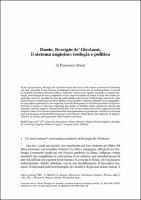Chapter Dante, Remigio de’ Girolami, il sistema angioino: teologia e politica
| dc.contributor.author | Bruni, Francesco | |
| dc.date.accessioned | 2022-06-01T12:17:49Z | |
| dc.date.available | 2022-06-01T12:17:49Z | |
| dc.date.issued | 2020 | |
| dc.identifier | ONIX_20220601_9788855180467_453 | |
| dc.identifier.issn | 2704-6079 | |
| dc.identifier.uri | https://library.oapen.org/handle/20.500.12657/56270 | |
| dc.description.abstract | This article draws a comparison between Dante’s vision and the cultural, political, and propagandistic conception promoted by the Angevins, from the divergences in the interpretation of Aquinas’ doctrine of Justice to the ones regarding the notion of nobility. Dante expressely chooses his meeting with the Angevin Charles Martel (Pd. VIII) to set human free will in opposition to the Angevin vision of virtue as a good inherited from generation to generation: Charles is a virtuous man not because of, but despite being born into a family which denies the authority of Empire, which is to say the only guarantor of the bonum commune. | |
| dc.language | Italian | |
| dc.relation.ispartofseries | Reti Medievali E-Book | |
| dc.subject.other | Middle Ages | |
| dc.subject.other | 13th-14th Centuries | |
| dc.subject.other | Dominican Order | |
| dc.subject.other | Dante Alighieri | |
| dc.subject.other | Remigio de' Girolami | |
| dc.subject.other | Anjou | |
| dc.title | Chapter Dante, Remigio de’ Girolami, il sistema angioino: teologia e politica | |
| dc.type | chapter | |
| oapen.identifier.doi | 10.36253/978-88-5518-046-7.16 | |
| oapen.relation.isPublishedBy | bf65d21a-78e5-4ba2-983a-dbfa90962870 | |
| oapen.relation.isbn | 9788855180467 | |
| oapen.series.number | 36 | |
| oapen.pages | 42 | |
| oapen.place.publication | Florence |

